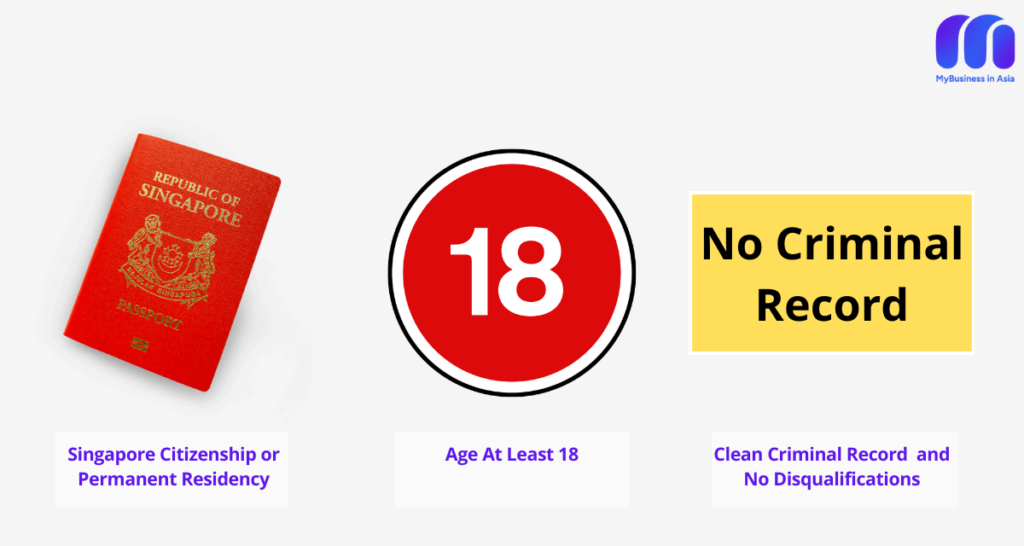If you are a foreigner looking to start a company in Singapore, it is essential to know that a key requirement is appointing a Nominee Director to comply with local laws.
This article will explain what a Nominee Director is, their responsibilities, who qualifies for the role, how to appoint one, and the potential risks involved.
- Who is a Nominee Director
- What are the roles and responsibilities of a Nominee Director
- Eligibility criteria for a Nominee Director in Singapore
- What differentiates a Nominee Director from an Executive Director
- Steps to appoint a Nominee Director
- Risks of hiring a Nominee Director
What is a Nominee Director
Under Singapore’s Company Act, every company incorporated in Singapore must have at least “one local resident director on its company’s board at all times” for compliance purposes.
These directors are responsible for overseeing and ensuring that companies established by foreigners comply with Singapore’s local laws.
A local resident director is defined as an individual who physically resides in Singapore (verified by proof of a local residential address) and is not disqualified from holding a directorship role.
If the company’s beneficial owner or appointed directors are not residents of Singapore, they may appoint a Nominee Director to meet this requirement.
The term “Nominee” signifies that this director role is strictly non-executive within the company. The primary function of a Nominee Director is to represent the appointing party without holding shares or having executive directorial responsibilities.
Hence, if you plan to incorporate a company in Singapore without a local resident director, you will need to appoint/hire a Nominee Director to complete the incorporation process successfully.
What are the roles and responsibilities of a nominee director
The roles and responsibilities of a Nominee Director in Singapore generally include:
- Meeting Legal Requirements: The primary role of a Nominee Director is to satisfy the legal obligations under Singapore’s Companies Act, which requires all companies registered in Singapore to have at least one resident director.
- Compliance: Ensuring the company adheres to all relevant laws, regulations, and corporate governance standards in Singapore. This includes filing annual returns, maintaining statutory registers, and meeting tax obligations.
- Fiduciary Responsibility: The Nominee Director represents the appointing party on the company’s board, upholding their interests within the legal framework of Singapore. They must also maintain strict confidentiality regarding company matters and sensitive information, safeguarding the appointing party’s interests.
Overall, the Nominee Director acts as a local representative to facilitate the company’s smooth operation within Singapore’s regulatory framework, ensuring compliance and protecting the appointing party’s interests.
Eligibility criteria for a Nominee Director in Singapore
According to the Singapore Companies Act, a nominee must be:
- A citizen or permanent resident of Singapore or a holder of an Entrepass work visa with a permanent Singapore address; and
- At least 18 years of age and
- Has a clean criminal record with no disqualifications

What differentiates a Nominee Director from an Executive Director
While nominee directors and regular directors share similar obligations, there are key differences between the two roles. Nominee Directors do not hold executive authority or engage in the company’s management, whereas regular directors have an executive role that includes making management decisions and overseeing daily operations. This distinction is crucial as it clarifies the roles and responsibilities of each type of director, ensuring effective and compliant company operations.
In essence, nominee directors act as a local presence for foreign entities in Singapore, assisting them in navigating the legal and regulatory landscape and establishing a local foothold. Conversely, regular directors are more actively involved in the company’s daily operations and decision-making processes, guiding its strategic direction and growth.
Outsourcing Nominee Director services is often one of the first recommendations for foreign companies looking to expand into Singapore, especially if the business owner does not yet possess an Employment Pass. MyBusiness In Asia is proud to offer a team of Nominee Directors in Singapore who can help ensure your business is set up successfully and all local compliances are met.
Steps to appoint a Nominee Director
The process of appointing a Nominee Director in Singapore typically involves the following steps:
- Identify a Suitable Nominee: Select an individual who meets the eligibility criteria to serve as a nominee director. This person should be a resident of Singapore with a clean record and a solid understanding of the role.
- Agreement: Reach an agreement with the chosen nominee director regarding their appointment. This agreement should outline their responsibilities, remuneration (if applicable), and any other relevant terms.
- Documentation: Prepare the necessary documents to formalize the appointment. This may include a director’s consent form, an indemnity agreement, and any other required legal documentation.
- Submission to ACRA: Submit the relevant forms and documents to the Accounting and Corporate Regulatory Authority (ACRA) of Singapore. This usually involves filing the necessary forms online through ACRA’s BizFile+ portal.
- Payment of Fees: Pay any applicable fees for the appointment of the nominee director. These fees may vary depending on the service provider and the complexity of the appointment process.
Once the appointment is processed and approved by ACRA, the nominee director will be officially added to the company’s board and can begin fulfilling their legal duties and responsibilities.
Risks of hiring a Nominee Director
Hiring a Nominee Director for your company in Singapore comes with certain risks and considerations, including:
- Confidentiality Concerns: The Nominee Director may have access to sensitive company information, raising concerns about confidentiality and potential misuse. It is essential to establish clear confidentiality agreements and safeguards to protect your company’s interests.
- Legal Liability: Even though they serve as a Nominee Director, they may still be held legally liable for the company’s actions. If the company engages in unlawful or improper activities, the Nominee Director could face accountability, which could lead to legal consequences.
- Reputation Risk: Should the Nominee Director’s reputation suffer or if they become involved in controversies, it may negatively impact your company. This could affect your business relationships, credibility, and overall reputation in the market.
To minimize these risks, it is crucial to choose a capable and trustworthy Nominee Director who understands well Singapore’s Companies Act and local laws and regulations. Collaborating with reputable nominees, establishing clear agreements and safeguards, and maintaining open communication can help mitigate these risks and ensure compliance with applicable laws and regulations.
Summary
In conclusion, appointing a Nominee Director is essential for foreigner aiming to incorporate a company in Singapore. Nominee Directors play a vital role in ensuring compliance with local laws, providing a local address, and acting in the best interests of the company. By understanding the eligibility criteria, roles and responsibilities, and the appointment process, you can effectively navigate the complexities of appointing a nominee director in Singapore.
Moreover, seeking professional assistance can help ensure adherence to local laws and regulations, thereby mitigating potential risks and challenges. Remember, the success of your company in Singapore largely depends on the competence and reliability of your Nominee Director, so it’s important to choose wisely.


